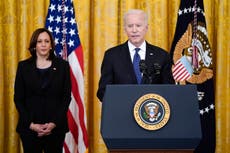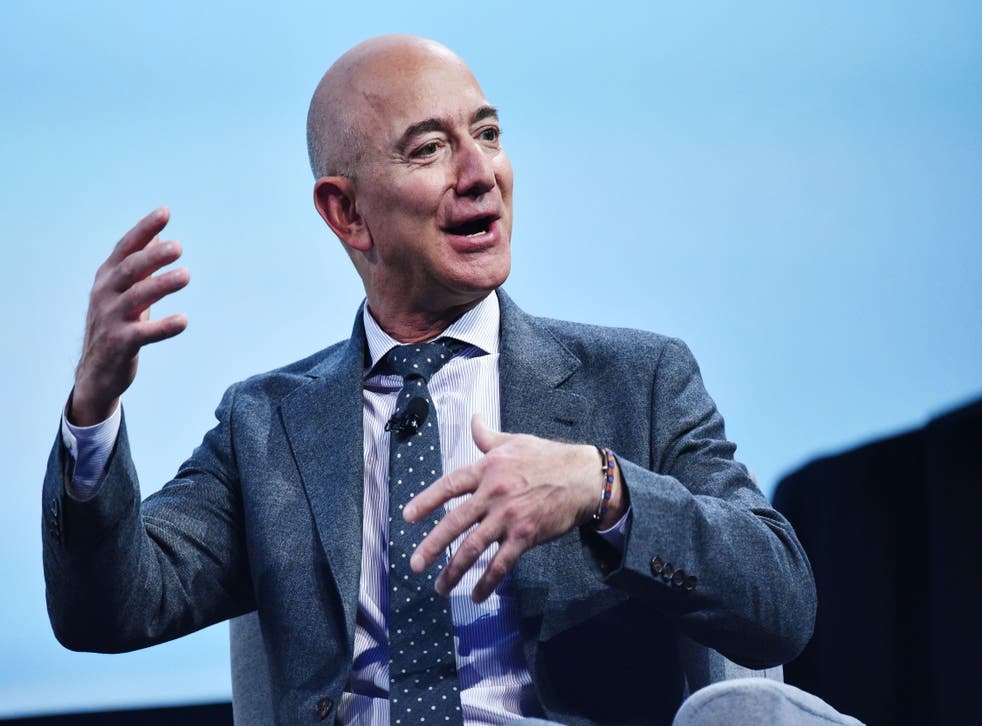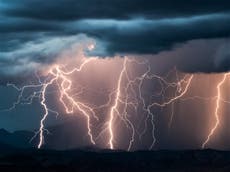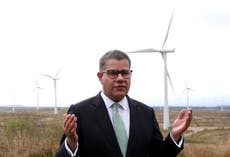World’s richest man putting aside almost one-fifth of his colossal Amazon fortune to support environmental initiatives but has nevertheless attracted criticism
Joe Sommerlad@JoeSommerlad
Jeff Bezos, the founder and CEO of online retail behemoth Amazon, announced the establishment of the Bezos Earth Fund on 17 February 2020, a new philanthropic initiative that would see him hand out $10bn in donations to environmental groups to address the climate crisis.
“Climate change is the biggest threat to our planet,” he wrote on Instagram at the time. “I want to work alongside others both to amplify known ways and to explore new ways of fighting the devastating impact of climate change on this planet we all share.
“This global initiative will fund scientists, activists, NGOs – any effort that offers a real possibility to help preserve and protect the natural world. We can save earth. It’s going to take collective action from big companies, small companies, nation states, global organisations, and individuals.”
Mr Bezos said that the $10 billion being put forward was “to start”, implying that the fund might be replenished in future, and, since making the announcement, the richest man on earth’s net worth has ballooned by $64 billion in a year to $177 billion, according to Forbes, the result of the home shopping boom inspired by national lockdowns around the world in response to the coronavirus pandemic.
Given Amazon’s ongoing dominance of global retail, almost single-handedly killing off the traditional high street over the course of its rise and rise, it is hoped that more will be forthcoming when the original amount is spent, which is expected to have come to pass by 2030.
Recommended

World must immediately ‘abandon coal’ and scrap new petrol cars by 2040 if it is to meet climate goals, UK says
Mr Bezos announced the first tranche of funding on 16 November, gifting a total of $791 million (about eight per cent of the total) to 16 green groups, the majority “legacy” organisations with a proven track-record like the Natural Resources Defense Council (NRDC), the Environmental Defense Fund, the World Wildlife Fund and the Nature Conservancy.
Those four are understood to have received $100 million each, with the most revealing choice being the first.
The NRDC was until recently led by Gina McCarthy, now serving as the first White House national climate advisor under President Joe Biden, suggesting Mr Bezos is backing political policy-making clout over grassroots technological innovation, at least initially
That approach comes in contrast to Amazon’s own $2 billion climate fund (distinct from Mr Bezos’s personal project) backing initiatives to get more electric vehicles on the road and capturing carbon dioxide emissions or Microsoft investing $1 billion over four years in speculative technologies to remove CO2 from the atmosphere.
Among the other recipients of Bezos Earth Fund cash are some newer startups like the NDN Collective and the Hive Fund for Climate and Gender Justice and research groups like the Rocky Mountain Institute and World Resources Institute.
The remainder is comprised of the Climate and Clean Energy Equity Fund, the ClimateWorks Foundation, Dream Corps Green For All, the Eden Reforestation Projects, the Energy Foundation, the Union of Concerned Scientists, the Salk Institute for Biological Studies and the Solutions Project.
“I’ve spent the past several months learning from a group of incredibly smart people who’ve made it their life’s work to fight climate change and its impact on communities around the world,” Mr Bezos said in another Instagram post announcing the grantees.
“I’m inspired by what they’re doing, and excited to help them scale.”
As to how the money might be invested, the Environmental Defense Fund – to give one example – told The Verge that the majority of its grant will go towards launching a satellite in 2022 to monitor global methane emissions and building a platform to make that data publicly available.
But Mr Bezos’s gesture has not passed without significant criticism, not least because the amount – though still a remarkable sum and more than welcome when just two per cent of philanthropy goes towards climate causes every year – accounts for just 17.7 per cent of his estimated personal fortune.
“A reminder that Jeff Bezos has made over $48 billion during the pandemic while over 40 million Americans have filed for unemployment,” the Sunrise Movement tweeted on 28 September, before the final extent of his haul from goods sales during the pandemic became known.
“Imagine if he actually had to pay taxes and what that money could help fund.”
The Center for Community Action and Environmental Justice (CCAEJ) has also been highly critical along similar lines.
“He has an opportunity to do so much with the funds that he has provided out there, although I would still consider it chump change compared to the wealth that he has accumulated off the backs of our people,” said Gabriela Mendez, a community organiser with the nonprofit.
The CCAEJ has also attacked Amazon’s own environmental record in southern California where many of its warehouses are located and where there is a significant air pollution problem, which the group has blamed in part on the company’s bustling delivery trucks, calling on it to switch to zero-emissions vehicles (and improve worker conditions while they are at it).
Taking a similarly hardline is the Criminal Justice Alliance (CJA), which responded to the fund by saying: “No amount of greenwashing will absolve Jeff Bezos or Amazon of the harm they have inflicted on frontline communities and workers, or our planet.
Jeff Bezos
(AFP/Getty)
“If the Earth Fund wants to purport to save the planet, they should send funds directly to grassroots communities who are the least responsible and hardest hit by climate disaster and the kinds of rapacious business practices Bezos engages in.”
Mr Bezos announced the first tranche of funding on 16 November, gifting a total of $791 million (about eight per cent of the total) to 16 green groups, the majority “legacy” organisations with a proven track-record like the Natural Resources Defense Council (NRDC), the Environmental Defense Fund, the World Wildlife Fund and the Nature Conservancy.
Those four are understood to have received $100 million each, with the most revealing choice being the first.
The NRDC was until recently led by Gina McCarthy, now serving as the first White House national climate advisor under President Joe Biden, suggesting Mr Bezos is backing political policy-making clout over grassroots technological innovation, at least initially
That approach comes in contrast to Amazon’s own $2 billion climate fund (distinct from Mr Bezos’s personal project) backing initiatives to get more electric vehicles on the road and capturing carbon dioxide emissions or Microsoft investing $1 billion over four years in speculative technologies to remove CO2 from the atmosphere.
Among the other recipients of Bezos Earth Fund cash are some newer startups like the NDN Collective and the Hive Fund for Climate and Gender Justice and research groups like the Rocky Mountain Institute and World Resources Institute.
The remainder is comprised of the Climate and Clean Energy Equity Fund, the ClimateWorks Foundation, Dream Corps Green For All, the Eden Reforestation Projects, the Energy Foundation, the Union of Concerned Scientists, the Salk Institute for Biological Studies and the Solutions Project.
“I’ve spent the past several months learning from a group of incredibly smart people who’ve made it their life’s work to fight climate change and its impact on communities around the world,” Mr Bezos said in another Instagram post announcing the grantees.
“I’m inspired by what they’re doing, and excited to help them scale.”
As to how the money might be invested, the Environmental Defense Fund – to give one example – told The Verge that the majority of its grant will go towards launching a satellite in 2022 to monitor global methane emissions and building a platform to make that data publicly available.
But Mr Bezos’s gesture has not passed without significant criticism, not least because the amount – though still a remarkable sum and more than welcome when just two per cent of philanthropy goes towards climate causes every year – accounts for just 17.7 per cent of his estimated personal fortune.
“A reminder that Jeff Bezos has made over $48 billion during the pandemic while over 40 million Americans have filed for unemployment,” the Sunrise Movement tweeted on 28 September, before the final extent of his haul from goods sales during the pandemic became known.
“Imagine if he actually had to pay taxes and what that money could help fund.”
The Center for Community Action and Environmental Justice (CCAEJ) has also been highly critical along similar lines.
“He has an opportunity to do so much with the funds that he has provided out there, although I would still consider it chump change compared to the wealth that he has accumulated off the backs of our people,” said Gabriela Mendez, a community organiser with the nonprofit.
The CCAEJ has also attacked Amazon’s own environmental record in southern California where many of its warehouses are located and where there is a significant air pollution problem, which the group has blamed in part on the company’s bustling delivery trucks, calling on it to switch to zero-emissions vehicles (and improve worker conditions while they are at it).
Taking a similarly hardline is the Criminal Justice Alliance (CJA), which responded to the fund by saying: “No amount of greenwashing will absolve Jeff Bezos or Amazon of the harm they have inflicted on frontline communities and workers, or our planet.

Jeff Bezos
(AFP/Getty)
“If the Earth Fund wants to purport to save the planet, they should send funds directly to grassroots communities who are the least responsible and hardest hit by climate disaster and the kinds of rapacious business practices Bezos engages in.”
In December, the CJA appealed to the beneficiaries of his donations to redirect 10 to 25 per cent of the capital into a pooled fund to be redistributed at a community level.
To appease transparency concerns about the Bezos Earth Fund, the retail magnate announced on 9 March that Dr Andrew Steer, former head of the World Resources Institute, would be serving as its CEO and president.
“The Earth Fund will invest in scientists, NGOs, activists, and the private sector to help drive new technologies, investments, policy change and behaviour,” Dr Steer subsequently wrote on Twitter.
“We will emphasise social justice, as climate change disproportionately hurts poor and marginalised communities.”


No comments:
Post a Comment